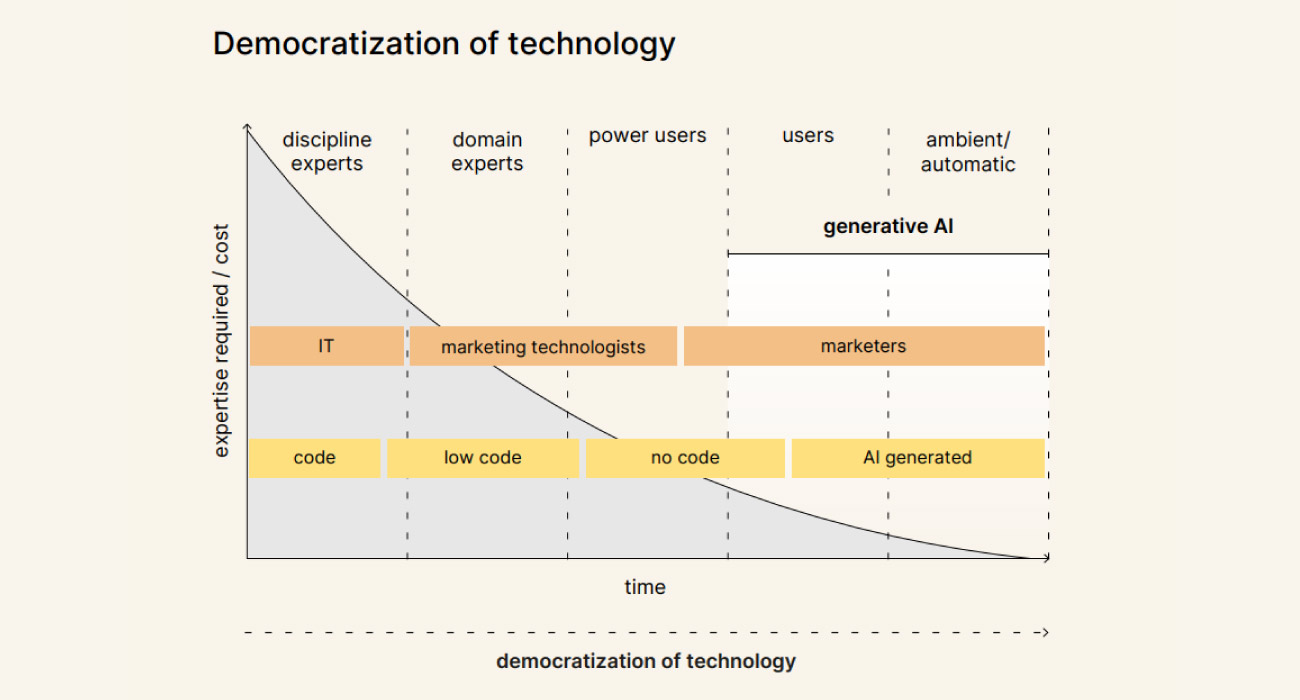In the new Martech for 2024 report, Scott Brinker, Editor of the chiefmartec blog and Frans Riemersma, Founder of MartechTribe, explore various themes, such as consolidation, dynamics of the “long tail” associated with small martech products, and composability.
Technology changes exponentially, but organisations change logarithmically. This is the hard truth of Martec’s Law, the greatest management challenge of the 21st century.
 “If you’ve ever felt that technology is moving too fast and that you never seem to be able to get ahead of it within your business — you’re always chasing or being chased by something — then you’ve felt the weight of Martec’s Law.
“If you’ve ever felt that technology is moving too fast and that you never seem to be able to get ahead of it within your business — you’re always chasing or being chased by something — then you’ve felt the weight of Martec’s Law.
This dynamic is not unique to martech. But it is something that everyone who touches martech is acutely aware of. AI has certainly amplified this sensation,” states a recent report, Martech for 2024, written by Scott Brinker, Editor of the chiefmartec blog and Frans Riemersma, Founder of MartechTribe.
Composability is a paradigm shift gaining traction in martech, revolving around the creation of bespoke solutions by combining data and services from multiple products and sources – according to the report.
This “best-of-feature” approach sees marketers leveraging the optimal features for each specific use case, irrespective of the hosting software. While composability may seem novel, it’s an evolution of the composability principles that have been present in martech stacks for years.
The AI-age
Beyond merely discussing AI as a standalone technological disruption, it’s important to talk about the significant architectural transformations unfolding in martech — specifically, aggregation and composability. These shifts are poised to facilitate more sophisticated AI use cases, serving as the robust foundation upon which generative AI will build its capabilities.
“I see Gen AI playing at all levels of the martech stack: the underlying data, the orchestration and decisioning layer, the user interface for marketers, and ultimately the customer experience for both human buyers and AI agents working on behalf of human buyers,” says Brinker to Martechview.
“I am most excited about the coalescing universal data layer. Having access to all the data, aggregated across the organisation and different apps and touchpoints, will provide enormous fuel for the next generation of AI-powered digital operations and customer experiences,” he adds.
Will martech growth ever stop?
 Over the last decade, the number of software apps in the martech universe continued to grow at a remarkable pace. The authors state that the most common question they heard with every annual release of their expanded landscape supergraphic was: “When will consolidation in the market happen?”
Over the last decade, the number of software apps in the martech universe continued to grow at a remarkable pace. The authors state that the most common question they heard with every annual release of their expanded landscape supergraphic was: “When will consolidation in the market happen?”Brinker and Riemersma delve into uncovering the 2024 trends and more.
In the report, the duo explore various themes, including consolidation, shedding light on the intriguing dynamics of the “long tail” associated with small martech products. The authors uncover major trends within stacks, elucidating the evolving architecture and management of martech. The report also features exclusive interviews with martech experts representing their five sponsors—GrowthLoop, mParticle, OfferFit, SAS, and Snowplow.

Additionally, the report identifies two models of aggregation platforms: horizontal aggregation and vertical aggregation. Unlike attempts to reduce the diversity of data or services within an organisation, these platforms aim to enhance accessibility and usability, providing a unified experience regardless of the multitude of resources at play.
Talking to Martechview, Riemersma adds, “With all the Martech in the world currently we can now truly focus on shaping the customer experience by interpreting what customers are telling us about our brands/products/communications via the data. Our report will help brand leaders to make better decisions as it is coining the idea of composing the Martech stack as an integral part of the overall company strategy execution.”
As we gaze into the martech landscape of 2024, the dual forces of composability and aggregation are poised to reshape the industry, offering marketers a nuanced approach to navigate the evolving terrain while maximising the potential of their technology investments.










